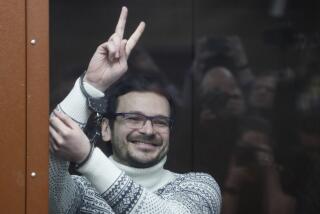Solzhenitsyn Reportedly Gets Citizenship Back : Soviet Union: The rights of a large number of exiles are restored. No names are officially released.
- Share via
MOSCOW — The Soviet Union today restored the citizenship of a large number of exiles, and among those reported on the list were Nobel Prize-winning authors Alexander Solzhenitsyn and Joseph Brodsky.
President Mikhail S. Gorbachev “canceled the decrees on citizenship concerning a number of persons who are now living abroad,” Tass news agency reported, citing an official announcement.
The decree came two days after Gorbachev issued a sweeping decree restoring the rights of all victims of Stalin’s repressions, saying thousands of innocent people still bore “a stain of injustice.”
The brief report on today’s order said it dealt with “injustices that occurred between 1966 and 1988,” but did not say if it affected everyone whose citizenship was revoked during that period. Nor did it name anyone in particular.
But Foreign Ministry spokesman Yuri Gremitskikh said the order “concerns a rather large number of people. Some names were mentioned--Brodsky, Solzhenitsyn.”
“I just heard that ostensibly Mr. Solzhenitsyn got back his Soviet citizenship, but I don’t know for sure,” Gremitskikh said.
The government of former Soviet leader Leonid I. Brezhnev revoked the citizenship of prominent authors and performing artists who spoke out against repression in their homeland.
But Gorbachev’s government has restored the citizenship of a number of them, notably cellist and conductor Mstislav Rostropovich and his wife, singer Galina Vishnevskaya.
Both Solzhenitsyn and Brodsky spent time in Soviet prison camps for their political views.
Solzhenitsyn is the author of “The Gulag Archipelago,” which depicted the horrors of dictator Josef Stalin’s prison camps. The author was charged with high treason in 1974, stripped of his citizenship and expelled from the country. He now lives in Vermont.
Solzhenitsyn came under particular criticism in his homeland because he condemned not only Stalin but also V. I. Lenin.
Solzhenitsyn has said he would not return to the Soviet Union unless all of his books were published and widely available.
A number of his books have been printed, but almost none can readily be found in the shortage-plagued Soviet Union.
Brodsky is a poet and essayist who now lives in New York. Only a few of his works were published in the Soviet Union until the literary monthly Novy Mir printed a selection after he won the 1987 Nobel Prize for Literature.
He was sentenced to five years in an Arctic labor camp in 1964 after being convicted of “parasitism,” but released after 18 months.
Parasitism was the crime of not holding a job. Many dissidents were fired, barred from working and then found guilty of parasitism.
Brodsky left the Soviet Union in 1972 after being told by secret police to emigrate or “face the consequences.”
More to Read
Sign up for Essential California
The most important California stories and recommendations in your inbox every morning.
You may occasionally receive promotional content from the Los Angeles Times.













